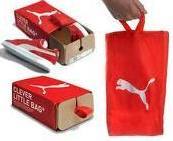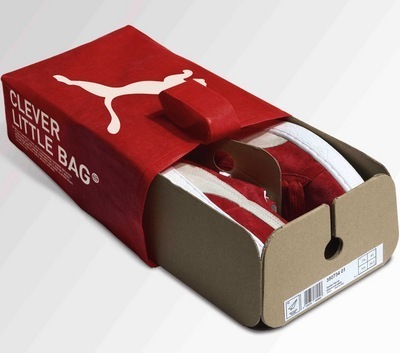
UMA partnered with designer Yves Béhar, of San Francisco based fuseproject, to rethink the way the millions of pairs of shoes that it sells each year are packaged — less packaging means fewer raw materials, less use of water and energy to produce, and less weight to ship and to be disposed of.
Béhar designed a “Clever Little Bag” to replace the cardboard shoebox with a re-usable shoe bag, that protects each pair of shoes from damage from the point it leaves the factory until the consumer takes it home — thus generating savings on the production side due to less material used, reducing weight during transport and eliminating the need for extra plastic carrier bags.
As a result of the 65% paper reduction through the “Clever Little Bag” concept PUMA will reduce water, energy and diesel consumption on the manufacturing level by more than 60% per year.
In other words:
“I was excited to partner with PUMA and contribute to such a game changing project,” said Yves Béhar. “PUMA’s initiative to look closely at one of the most challenging issues facing the retail industry in regards to sustainability and environmental harm was inspirational. In changing the packaging and distribution life cycle from the ground up, we hope our new design and comprehensive solution encourages other retail companies to follow suit.”
PUMA’s apparel collections will be bagged using sustainable material, replacing traditional polyethylene bags. This means that 720 tons of polyethylene bags can be avoided per year, which equals a saving of 29 million plastic bags — enough to cover an area the size of 1000 football pitches. Furthermore, PUMA T-shirts will be folded one more time to reduce the packaging size and thus saving CO2 emissions and costs during transport.
By switching out current plastic and paper shopping bags in PUMA stores and replacing them with sustainable biodegradable bags the sportlifestyle company is looking to save another 192 tons of plastic and 293 tons of paper annually.

Comments by our Users
Be the first to write a comment for this item.